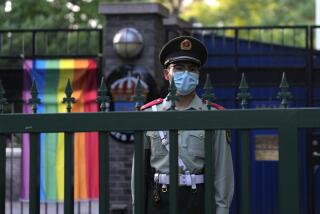U.S. lobbyists may set up office in Iran
- Share via
TEHRAN — Now the ball is in Iran’s court.
Last week Washington granted a rare waiver to allow a U.S.-based Iranian American lobbying group to set up shop here in what some consider a gesture of diplomatic outreach. But Iranian officials, who must grant permission for the American-Iranian Council to open a branch, have responded coolly to the modest olive branch.
The council announced last week that the U.S. Treasury Department’s Office of Foreign Assets Control had granted it permission to open an office in Tehran, something ordinarily forbidden because of a strict embargo on all but a few types of business relations with the Islamic Republic.
The New Jersey-based group, which describes itself as a nonpartisan, nonprofit think tank, seeks to promote friendly ties between Iran and the United States. Its president and founder, Hooshang Amirahmadi, a scholar at Rutgers University, travels frequently to Tehran and met Iranian President Mahmoud Ahmadinejad when he was at the United Nations last month.
“This means that the U.S. government is genuinely interested in expanding exchange between the peoples of Iran and the United States,” Amirahmadi said from the U.S. in a telephone interview Saturday. “I also believe that the U.S. government expects that our presence in Iran will help in a better understanding of the issues that exist between the two governments.”
Amirahmadi said he had formally applied to Iranian officials for permission to open the office.
The U.S. waiver comes as the Bush administration appears to have stepped back from a confrontation with Iran over its nuclear program and alleged support for militant groups that nearly reached boiling point last year. An anonymous U.S. official told the Reuters news agency that the administration granted the waiver in order to promote “cultural exchange and mutual understanding” between Americans and Iranians.
Amirahmadi, however, noted that his group had also cultivated extensive contacts with current and former government officials in Washington and Tehran.
Iranian officials greeted news of the waiver with caution.
“We do not assess such measures as the political will of the American administration,” Foreign Minister Manouchehr Mottaki said, according to the official Islamic Republic News Agency. “But at the same time such opportunities are open to our fellow countrymen.”
Despite Ahmadinejad’s public stance that he welcomes increased contacts between the U.S. and Iran, he and his inner circle have frequently rejected rapprochement attempts and jailed Iranian Americans such as scholars Haleh Esfandiari and Kian Tajbakhsh, who sought to foster academic ties between the two countries. They and some others were accused of trying to foment antigovernment movements.
A news website close to Ahmadinejad has already denounced the council. Raja News accused Amirahmadi of “running an errand for the propaganda machine of the Republican Party.”
Amirahmadi dismissed the report as the voice of isolated “pressure groups.”
Others criticized the administration’s move as a substitute for real diplomatic engagement.
“The U.S. has enough access to convey its message, and Iran equally has its own channels,” said Mohammad Marandi, head of North American studies at Tehran University. “If there is the political will in the U.S. to reduce tensions, let them send a signal officially.”
But some analysts predicted that the government ultimately would welcome the council.
“As a general rule, important decisions or U-turns can be taken by the ruling hard-liners,” said Mashallah Shamsolvaezin, a liberal journalist and activist who opposes Ahmadinejad.
When moderate former President Mohammad Khatami was in office, attempts to improve ties with U.S. officials were sabotaged, and he was even warned against shaking hands with President Clinton during a United Nations assembly, Shamsolvaezin said.
“Now Ahmadinejad goes to the U.S. and calls for debates with presidential candidates,” he said.
Allowing the council to open an office “is a good step that can be taken only by Ahmadinejad, who can sell it easily in the country,” he said, “and no one can dare disagree with him as he is supported by the most hard-line elements inside Iran.”
--
Special correspondent Mostaghim reported from Tehran and staff writer Daragahi from Beirut.
More to Read
Sign up for Essential California
The most important California stories and recommendations in your inbox every morning.
You may occasionally receive promotional content from the Los Angeles Times.










